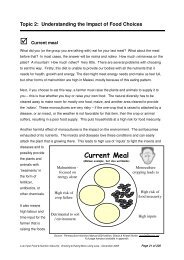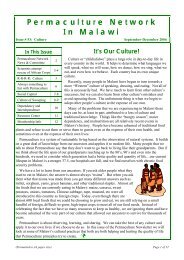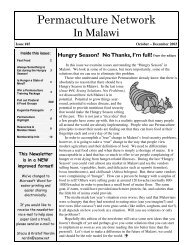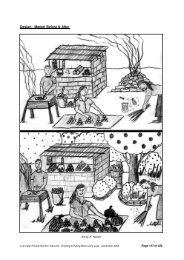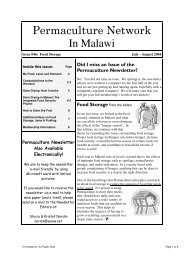Permaculture, Final Capstone Paper 5-26, Hope - Never Ending Food
Permaculture, Final Capstone Paper 5-26, Hope - Never Ending Food
Permaculture, Final Capstone Paper 5-26, Hope - Never Ending Food
Create successful ePaper yourself
Turn your PDF publications into a flip-book with our unique Google optimized e-Paper software.
Table 6, cont.: Frequency of Evaluated Practices<br />
ZONE SYSTEM<br />
Frequency of practice 2 (7.4%) 2 (14.3%) 0<br />
PEST MANAGEMENT<br />
Strong smelling plants 7 (25.9%) 6 (42.9%) 1 (7.7%)<br />
Strong smelling water 3 (11.1%) 3 (21.4%) 0<br />
Strong smelling mulch 0 0 0<br />
Encourages beneficial<br />
Species<br />
1 (3.7%) 1 (7.1%) 0<br />
Intercrops 5 (18.5%) 5 (35.7%) 0<br />
Living fence 1 (3.7%) 1 (7.1%) 0<br />
Fence 4 (14.8%) 4 (28.6%) 0<br />
Other 5 (18.3%) 2 (14.3%) 3 (25%)<br />
USES INDIGENOUS / LOCALIZED VARIETIES<br />
Frequency of practice 19 (70.4%) 12 (85.7%) 7 (53.8%)<br />
SHARES KNOWLEDGE<br />
Frequency of practice 13 (48.1%) 9 (64.3%) 4 (30.8%)<br />
Qualitative data showed that for the most part, both adopters and non-adopters have<br />
chosen to cultivate just a few indigenous/localized greens: pumpkin, sweet potato, papaya,<br />
mango, black jack, amaranth, spider plant, and groundnuts, avocado and local maize. With over<br />
600 food plants indigenous to Malawi (Nordin, 2005), there exists a significant opportunity for<br />
under-utilized plants to contribute to achieving food and nutrition security. Interviews and focus<br />
groups discussions highlighted a significant barrier to growth of such “bush foods”: culture.<br />
Many individuals, as well as all three focus groups said that such food plants “come from the<br />
bush” and therefore do not have to be cultivated. Additionally, a few participants alluded to the<br />
“shame” associated with eating “poor peoples’ plants” and questions about them were often met<br />
with snickering and shyness. Those who admitted to growing and eating “bush foods” cited the<br />
Bible, particularly Genesis and mankind’s mandated stewardship of the earth, as a source of<br />
support and guidance (ID17, ID5).<br />
There are a significant number of practices that neither adopters nor non-adopters had a<br />
frequency above 50 %:<br />
41



